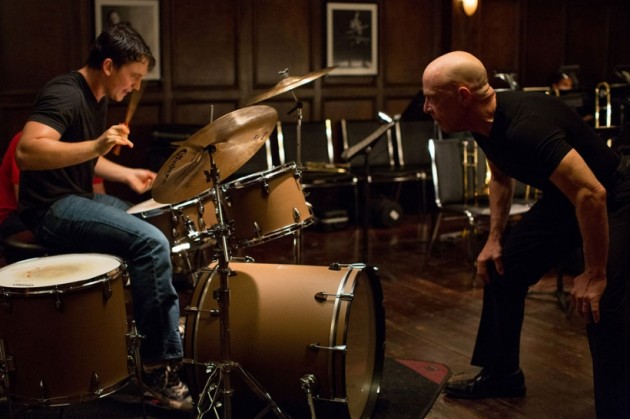True to its title, Whiplash hits like a double decker. I left the screening of writer-director Damien Gazelle’s astonishingly hot-blooded second feature dizzy and elated. Andrew Neiman (Miles Tenner) is a young, ambitious jazz drummer attending the fictional Schaffer Conservatory, the most prestigious music academy in the United States, and suffering from an acute case of what we might call ‘undergrad hubris’. Desperate to impress, he falls under the tutelage of the school’s alpha dog, Terence Fletcher (J. K. Simmons), a merciless instructor who demands excellence of his pupils and enforces standards through a robust programme of terror and humiliation. Whiplash arrives on the back of breathless critical enthusiasm and – thank the lord – it delivers. It’s a high-voltage burst of cinematic electricity; a musical coming-of-age story with the nerve-shredding tension of a high-stakes thriller, or perhaps a horror film, with Fletcher as the smoke-belching monster ready to wolf down the out of tune and out of practice.
Simmons plays Fletcher with the conviction of a performer who knows he’s found a once-in-a-career role. He conducts his theatre of cruelty with a commanding brutality, flinging profane verbal daggers and face slaps at anyone disrupting the band’s sacred tempo. There was a danger of Simmons playing Fletcher as a chair-chucking cartoon, like J. Jonah Jameson without the moustache, but he brings out the conductor’s deliciously layered viciousness. His fury is dispensed with righteous precision, like the fists of a skilled boxer (the sweeping camera movements and isolating two-shots emphasize the pugilist theme). Fletcher’s high-volume assaults are intense, but the really terrifying stuff is when he goes quiet. He coaxes and goads the disorientated Andrew like a professional abuser. On the pupil’s first day with the band, Fletcher pulls his romantic new recruit aside for some buddy talk and tells him to ‘just relax, man’, before shredding him in the trailer’s ‘are you a rusher or a dragger?’ showstopper. He slaps you on the back before slipping in the blade.
Whiplash has an experienced technician’s love for the musical process but part of its perverse, quite possibly immoral, appeal is its lashings of naked contempt, for the conventions of the ‘inspirational mentor’ sub-genre and, through Fletcher, of ‘participation prize’ culture more generally. You get the sense that if Fletcher ever saw the ending of Dead Poets Society he’d start vomiting out of disgust. Gazelle keeps audience on their toes by introducing familiar genre elements, before bursting off in the opposite direction. There’s a turn about two-thirds of the way in that’s an utterly thrilling ‘fuck-you’, doubling down on the film’s scorn for safe emotionalism and complicating Fletcher’s self-professed ‘hurt you to help you’ motivation. It gives us a hero who is barely worth rooting for. Teller pivots his assholish dude persona from Project x, 21 and Over and That Awkward Moment into an assholish music-school type; entitled and snobbish, sniping at other people’s achievements (‘turn my pages, bitch!’ is basically the music-school equivalent of ‘do you even lift, bro?’). He doesn’t necessarily want to make great music; he wants to go down in the books as being great, and those are different things. When he finally meets Fletcher on his own terms they turn into a thrilling and grotesque double-act.
Whiplash was expanded from Gazelle’s short of the same name, but it loses none of its vitality or leanness. It zips by with a musician’s appreciation for tempo, powering through the screenplay’s coincidence crutches with Sharone Meir’s detailed photography and Tom Cross’ extraordinary editing, right through to its spectacular hold-your-breath climax. It’s the year’s best film so far; a sweating, bleeding, screaming missile aimed straight at cinema’s glib inspirationalism. Conor Smyth






